|
|
1080WKLO.com Paul
Cowley Tribute Page |
|
On this page you find items from and about WKLO's
popular DJ of the late '50s and early '60s |
|
Paul Cowley Remembers WKLO
Received April 20, 2005
In the mid '50s, I joined the WKLO
staff after a stint at WLW in Cincinnati and WLEX in Lexington. At that
time WKLO was basically country with DJs Jimmy Osborn, Jimmie
Logsdon and Tommy Downs. The only pop music was Beecher
Frank in the evening who built a huge teenage audience. I was hired
as a backup to him as rumors were flying that he might be moving to
another station. "Beech" did move later to WGRC (now known as WAKY) and
I took over his nighttime slot.
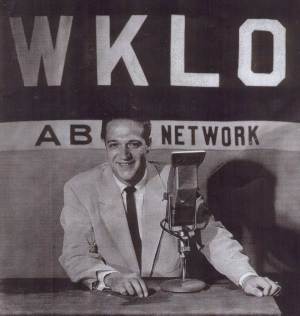
Beecher and I were friendly competitors
as we both were doing our shows from different Ranch House drive-in
restaurants. Bob Colglazier owned several drive-ins in the
greater Louisville area and they were great hangouts for kids growing up
in those innocent '50s. (Example: Arnold's Drive In on "Happy Days.")
Kids would park their cars for hours with their radios on, listening and
drinking malts and scarfing down Ranchburgers and fries. They would send
in "curb notes" via the carhops asking to hear a particular record
dedicated to their boyfriend or girlfriend. WKLO even built me a private
studio on the roof of the Ranch House on Shelbyville Road with their
call letters and my name in neon lights on the roof of the studio.
|
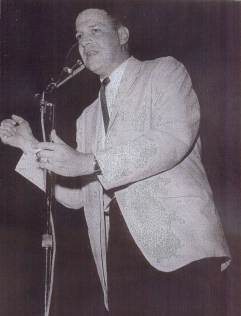 |
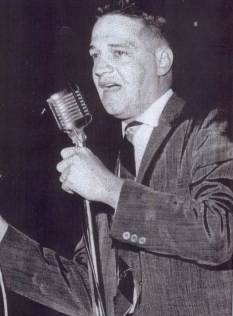 |
|
Introducing
Ricky Nelson at the Kentucky State Fair |
Introducing Elvis Presley |
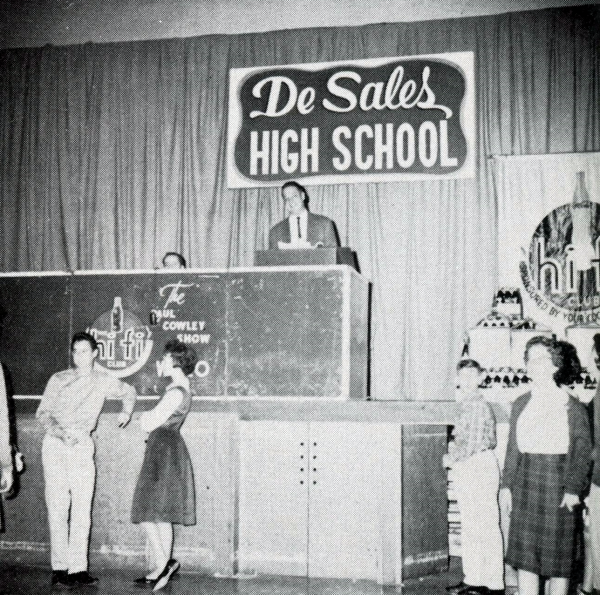
Paul Cowley at a Coca-Cola Hi-Fi Club dance at DeSales
High School
In the late '50s I was the voice of
Coca-Cola doing live record hops broadcast from different high school
gyms on Friday nights. In those days we called them "sock hops" because
to dance on the gym floors you had to take your shoes off to avoid
damaging the gym floor. That was when kids danced holding each other
rather than wild gyrations. What a difference a generation makes. (Too
bad today's generation has taken the melody out of music...so much for
rap!) The Coca-Cola Hi-Fi Club became so popular that later it went to
two nights of broadcast and Allen Bryan was added. I continued to
do Friday night's broadcast and Allen did Saturday night. I think we
both broadcast from every high school in the area at that time.
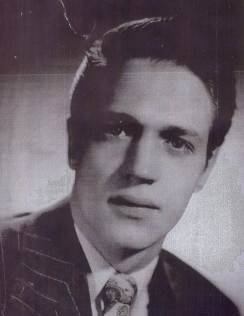
Paul Cowley's first publicity
photo
Around that time, Gordon McClendon
in Dallas bought the old WGRC, and changed the call letters to WAKY. It
was clever the way he did it. The deejays over there played the same
record over and over for 24 hours. I remember it well: It was Sheb
Wooley's "The Purple People Eater" and they had the whole town
talking about them. That's when the radio station wars began.

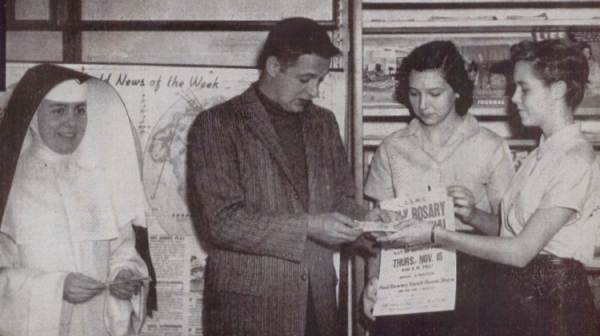
Both stations tried to outdo each other
with zany promotions. One of WAKY's best was The WAKY Mystery Walker who
would award you with cash if you could identify him on the street. You
couldn't walk down 4th Street without several kids stopping you and
asking if you were the mystery walker. Business people who made
advertising decisions were convinced that everybody in town was
listening to WAKY.
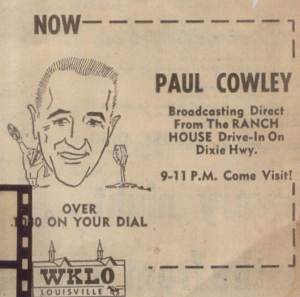
WKLO became the "Home of the Good
Guys," a promotion that backfired when the Courier-Journal printed a
story and picture of a guy in trouble with the police for some misdeed
and wouldn't you know it, he was wearing a t-shirt that read "I'm one of
WKLO's Good Guys."
Later, I had the chance to get into
management and joined the Polaris Broadcasting Company out of Chicago,
who owned several stations in the west and moved to Santa Rosa,
California at KPLS, then to KGNU in San Jose, on to KEDO/KLYK in
Longview, Washington and ending my radio days at KTRC in Santa Fe, New
Mexico, where I still live.
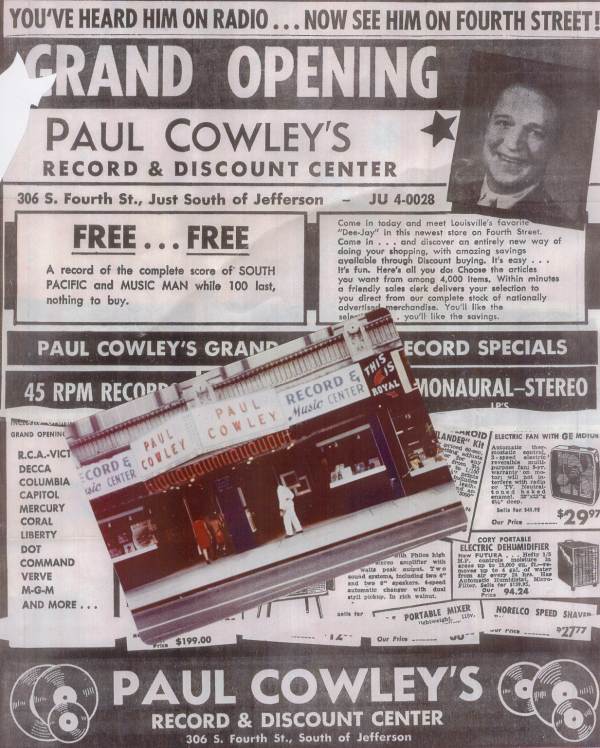
I later got into tourism doing tours
throughout Santa Fe and the state. I'm now with the Department of
Tourism as a tourist counselor.
I still recall fond memories of a
bygone time and if anybody reading this remember those days (God, you
gotta be old) I would love to hear from you at
paulhellou3@aol.com.
Paul Cowley
Santa Fe, New Mexico
April 20, 2005
Note: Paul
Cowley passed away in September 2011. |
|
Tube Talk
Louisville Times Column
January 31, 1984
What ever happened to…
Paul Cowley, famous disc jockey of the '50s at WKLO in
Louisville?
Cowley agreed to fill us in on his fortunes in a recent
interview.
How did you get started?
My first job in radio was in 1947 as a disc jockey in
Charleston, West Virginia for $24 a week. That's not I intended
to be. I started out to be an undertaker.
I came to WKLO in 1955 as a kind of backup to Beecher Frank, but
within a few months Beecher left to go WGRC, now WAKY. When he
left, I stepped into his time slot and we were on opposite each
other. We would both do location shows from the Ranch Houses, he
at one location and me at the other. Everyone though we were
enemies, but we were very, very friendly. In fact, I just talked
to him. He is living in Somerset, which is where he was from
originally. He left Louisville in 1961 and went back into the
oil business, but is now retired.
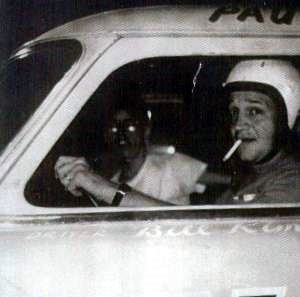
I stayed at WKLO, and in late
1965 I left Louisville to join a company called Polaris
Broadcasting, which owned several stations all across the
country, and one of them was KPLS in Santa Rosa, California.
That is about 50 miles north of San Francisco.
I was there for twp years when I was hired to run a station in
San Jose. I was there for two years when they sold their company
and the new owners wanted their own people.
In 1970, I joined Community Club Awards, which is what I do now.
CCA is a radio- and TV-promotion company. I am the Western
director, and I handle all the clients from Fairbanks, Alaska to
the Mexico border and from Salt Lake City to Honolulu. It is an
international company, and our clients are from many countries.
Had you ever worked in market larger than Louisville?
In 1960 I had an offer to go to New York, WABC, and at the time
it was the big disc-jockey station.
The offer made to me was a 13-week contract and the basis was
that I would be paid on the basis of a $35,000 salary, which in
the '60s was a fantastic salary. The stipulation was that at the
end of 13 weeks, the time slot I would be in was noon to 3. The
deal was that if the ratings went up or held in that slot, then
I would have gotten a year's contract. But if the ratings
dropped, I was out.
Maybe I didn't have the confidence I needed, but I couldn't see
gambling everything for 13 weeks. I've often wondered what would
have happened if I had done that.
I headquarter now in the Bay area, Foster City, just off San
Francisco Bay. I can live anywhere, because all of my business
is out of town, but I enjoy this area. I used to headquarter in
Los Angeles and was one of the few people who liked to live
there. Simply because I didn't work there, I lived there.
Whenever I was in L.A., it was party time. If I had to work
there and drive the freeway, than I wouldn't have enjoyed it.
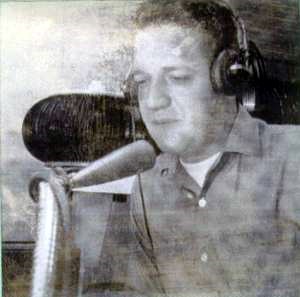
What about radio in this
area?
The radio business in Louisville, like in any city in America,
is totally changed. The only people active on the air that were
here when I was are Ken Rowland and Ryan Halleran.
Has anything unbelievable ever happened to you?
There were two things that happened in my time as a disc jockey
that if I had chosen to do it any different could have meant
that my whole life would be turned around.
In the mid-50s I had become familiar with many disc jockeys
around the country. One of them was Billy Phillips who was a
disc jockey in Nashville, Tennessee.
He called me one day and said he had found a young chap who he
though had a potential for the music business. He had the idea
the he was going to get five or six key disc jockeys around the
nation, form a corporation and sign this kid. And with our
influence in the record business, would get him a contract and
make a mint. I said, 'Send me a tape so I hear him.'
He sent me a tape, and I can even remember the two songs on the
tape. Of them was something called "Blue Moon of Kentucky." You
know what's coming don't you? The other was "Milk Cow Boogie
Blues." I listened to it one time and wrote a note back and told
him I had decided to pass. You, of course, know who that was -
Elvis Presley.
I can also remember being in New York one time and a guy by the
name of Archie Bryer said, "Hey, I've got a couple of kids from
Kentucky that I think have potential. Let me get a tape and let
you listen to it." Archie played this record for me, and after
he played it he asked me what I thought of it. I said, "Gee
Archie, save your money. These kids don't have a chance." The
song was "Bye Bye Love" by the Everly Brothers.
That's the crazy thing about the music business, you never know.
What do you do to relax?
My hobby is that I collect obits of famous people. I have so
many that they are cross-indexed. People call me in the middle
of the night to get information that they can't fin in any other
place.
Do you ever thing about reentering the market now that is
changing back to the old format?
No, I'll never go back. Yesterday is just a fond memory. |
|
Paul Cowley
Feature
Top Hit Club News
Date Unknown
(Editor's Note: When we
asked Paul Cowley of WKLO, Louisville, for some material on
himself we hardly expected the highly amusing letter he wrote.
We're reprinting it just as he wrote it!)
You asked for my story for
publication. You know on most biographies in this business you
read how this guy was born between the matinee and evening
performance backstage at the old Lyceum Theatre in Billings,
Montana and his first professional appearance was when he
toddled on stage at the age of three, interrupting his parent's
act! Nothing like that ever happened to me. In fact, when I stop
and think about it, I had a rather dull childhood.
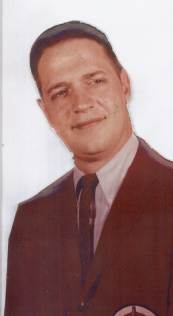
I'll never forget the day I
started in radio. It was in 1947 in Charleston, West Virginia as
an announcer and then as a deejay. I wish I could dream up some
fabulous success story about that job, but the only thing that
comes near, is the fact that I held on to it for a year! In 1948
I moved back to my home town, Cincinnati, where I went to work
at WNOP, a small indie across the river in Newport, Kentucky.
Now here's where the
riches-to-rags portion starts. An executive from WLW in
Cincinnati heard me and offered me a job as a television emcee.
Well, I went to work and laid what was probably the biggest bomb
in local TV history. In fact I ended up owing Hooper a couple of
points! So this jazz went on for another two years, with WLW
giving me numerous announcing chores on radio and TV. My claim
to fame there was the fact that I am the only announcer in the
history of that station that was never allowed to do "Moon
River." (Kinda chokes you up, doesn't it?)
In 1952, with this rich radio
background, I moved to WLEX in Lexington, Kentucky. It was there
that I really began to meet with success. Comparative ratings
proved that I had the top rated morning show. Drunk with
success, WKLO beckoned in 1955 offering much better money. Well,
the money wasn't really so much better, but the station had
better trade-out deals with its clients. I've been here ever
since.
Like I said, what can you do
with a story like that? Let's see how creative and good a liar
you can be.
Thanks again.
Paul |
|
How Do You Get To
Be A Disc Jockey?
Teen Magazine - "Mike Side"
Column
By Paul Cowley
WKLO, Louisville, KY
October 1958
WKLO's Paul
Cowley is "sitting pretty" on top of a Louisville, Kentucky
restaurant! In a specially built studio close to his listeners
and fans, Paul does a nightly four-hour R&R stanza that's tops.
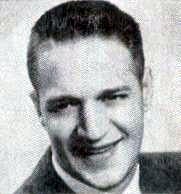
It's a pleasure to be asked by
the editors of this magazine to have a chance to visit with you.
I have a rather unique type of setup as far as broadcasting
goes. Nightly I broadcast from a specially built studio atop a
restaurant here in the Louisville area, spinning four hours
worth of pop and rock 'n' roll records. This gives me an added
advantage by being close to my audience with personal contact at
all times.
I don't suppose a night goes by
without someone asking me "How do you get to be a disc jockey?"
This is a hard question to answer because there is no set
pattern. It seems like each disc jockey gets started in a
different way. The only advice I can give you is start to
develop a "style" as soon as possible. Concentrate on ads in
newspapers and magazines and try to "ad lib" about the product.
Get to know the product well, its salable qualities, its
advantages, etc.
Don't worry about the records
and knowing about the record business. That will come with time
and experience. I don't care how good your voice will sound or
how smooth your introductions to the records are. If you are not
selling merchandise for your sponsor, you are not worth your
salary.
Just remember, when you are
auditioning for a job, your prospective "boss" is listening for
your "sell-ability." If you've developed that, you stand a good
chance.
If you are serious about
wanting to become a "deejay," just remember, it's not as easy as
you may think. It takes a lot hard work. There is a demand for
good jockeys constantly, so stick with it, and good luck! |
|
Paul Cowley
Broadcasts Hi-Fi Club From Cafeteria With Records, Prizes
Pioneer Post:
Our Lady Of Providence High School
Newspaper
January 29, 1960
"...Be listening
for...be watching for...the Hi-Fi Club of the Air."
On February 19,
WKLO's Hi-Fi Club of the Air will be broadcast from our Lady of
Providence. The scene will be a Coca-Cola dance from 8:00-11:00
p.m. in the cafeteria. Mr. Paul Cowley, WKLO disc jockey, will
be on hand to play records and give away valuable prizes.
The Coca-Cola
company is sponsoring 413 Hi-Fi clubs in cities throughout the
United States. The local Hi-Fi club is the second oldest in the
country, according to the emcee.
He has estimated
that approximately $1,500 in prizes was given away in '59.
Mr. Cowley visits a different school every Friday night and
recently, Saturday nights have been added to his schedule.
A Hi-Fi set is
given away at each dance, along with a Coca-Cola cooler and 100
cartons of Coke.
|
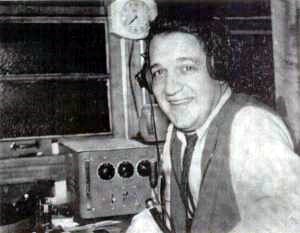 |
| Louisville disc jockey,
Paul Cowley from WKLO, sits in his "on the air booth" when
he broadcasts his nightly show from the station. He will
be at OLP for his program on February 19. |
Would-Be
Embalmer Discards Profession For Radio Work
By Lana Habermel
"Actually, I
started to become an embalmer," WKLO's Paul Coley revealed. "I
was studying at Cincinnati College of Embalming when...a friend
asked me to a show." He indicated at a small town in West
Virginia was the place where he began his radio career.
His interest in
teens, Mr. Cowley related, started when he was a teen himself.
"I tried to appeal to my own age group." Now he is still
entertaining the tuners with the High-Fi Club of the Air.
The club will hold
one of its weekly dances at Providence on February 19.
The soft-spoken
disc jockey shared that he went to Philadelphia to audition for
the American Bandstand show. "They narrowed it down to five and
then to three." He and Dick Clark were among the three. Dick
Clark got the job but Mr. Cowley assured him that there were no
hard feelings.
The record spinner
plans to continue with the Hi-Fi club which in its two year
history, has never had a demonstration of juvenile delinquency.
|
|
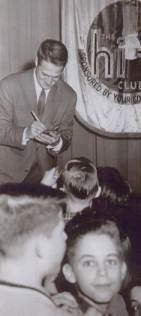 |
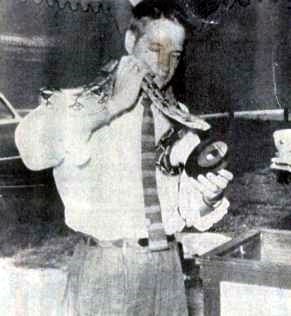 |
|
Paul
Cowley at a Hi-Fi Club Dance |
Paul
Cowley uses Kirby Stone's Cadence recording of "SSS'Wonderful"
to sooth the rattlesnake around his neck. The situation
arose when Paul tried interviewing a man at a new drive-in
who was buried alive for a week with twelve rattlers. |
|
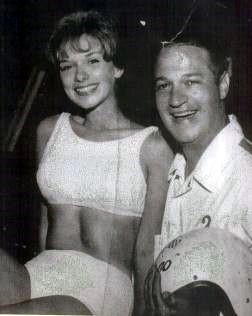 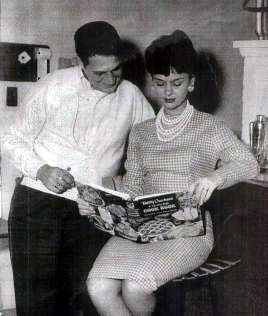 |
|
Paul
Cowley and wife Jeanette |
|
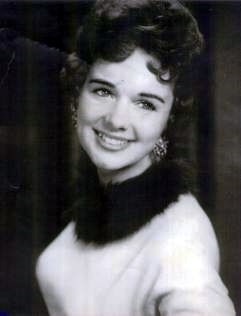 |
|
Paul's
favorite photo of Jeanette |
|
|
Top of Page |

|